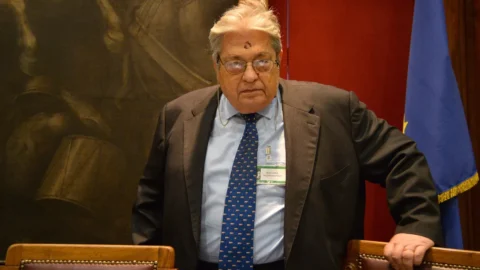“Expecto patronum!”. Who does not know the spell of the Harry Potter saga used with both hands especially by Hermione Granger? The Patronus Spell consists in summoning a silvery figure through the magic wand, which will defend the summoner for as long as the latter remains focused on his own intense happy memory.
And since in Ancient Rome the lawyer was precisely the patronus, it is not surprising that the category, demoralized by what it perceives as continuous attacks on its decorum and, above all, on its pecuniary, would gladly use of an “Expecto Patronum!” to make some silvery figure appear, I don't know, in the form of an exclusivity or a minimum fee, to protect it from the curses of Voldemort, the free market.
Seriously, the debate on Professional Orders is taking on surreal tones with cross-accusions of Leninism and corporatism, evocations of Caste and the obscure interests of the bosses.
Instead, everything should be brought back to a simpler question: which order of professions guarantees the greatest economic efficiency? Economic efficiency implies that consumers are not cheated (unfair and inefficient) and that professionals are remunerated according to market capacity and demand.
From this point of view, the existence of the Orders does not necessarily impede the game of competition, if they limit themselves to being associations that oversee the deontologically correct behavior of the members and their training. This is more or less the case in England, where the Inns of barristers train future patrons and regulate their behavior and so does the Law Society for solicitors.
On the other hand, the two institutions do not dream of putting their tongues to bear on tariffs, nor on closed numbers and, to a very large extent, not even on advertising. If the latter is not deceptive (in which case it is already sanctioned by law) it is not clear how it can harm the dignitas of the professional: if the person who does it feels calm, let him do it.
An Order should then have the conduct of its members judged not only by its own colleagues, but also by outsiders. It is strange how the forensic associations clamor for the reform of the CSM, hoping that it will no longer be made up mostly of magistrates - at least in the disciplinary section - and then be closed to any intrusion into their world.
Furthermore, the law should admit that professionals, if they want, can associate themselves in multidisciplinary companies, or capital companies and even be listed on the stock exchange: this is what is foreseen by the new English legal system and it is not clear why it should be prohibited in Italy. Retrenching against the entry of equity partners (prohibition established by fascist legislation to prevent Jewish lawyers from continuing to practice despite the racial laws: let's not forget that) is illiberal and self-defeating. First of all, the British, Australians (they too can be listed on the stock exchange) and Americans, strong in their capital, will be able to eradicate the Italians from the richest markets. Secondly, since the lawyer chooses the capital partners, it is not clear why they are more dangerous than the banks, ie the only possible alternative to finance the professional activity. Are we less slaves to selected shareholders than to creditors who can pull the plug at any time? Hm.
The exclusives, then, are unbearable: first of all those of pharmacists and notaries. The partial liberalization of pharmacies has lowered prices but has not increased the number of intoxicated people as feared by the Order (which even interferes in the opening hours and on the obligatory closing days of the pharmacies). But also for other professionals the reserved fields of action should be minimal (doctors and something for lawyers and engineers). Let's not talk about the closed number, both in terms of the number of exercises that can be opened and of those authorized to practice the profession (once again notaries and pharmacists); it is a simple closure of the market which has nothing to do with the merits and needs of consumers. Professionals seem to like the "Repello Babbanum" spell that keeps non-wizards at bay in the world of Harry Potter.
Moreover, the economic studies that have been carried out in various post-liberalization countries (in Holland, for example) show lower prices and - attention! - better quality of service.
Last but not least, it would be good for the professional funds to compete with each other and - with the exception of a minimum mandatory solidarity contribution - each professional should also be able to choose free pension funds for when they stop working: who said that the best choice for an accountant is the Cashier of accountants?
In short, if we took account of economic efficiency, the field would be cleared of the fumes of vested interests and tradition. Maybe with a nice Lumos Solem spell we could do it…
* Lawyer and president of the Adam Smith Society





